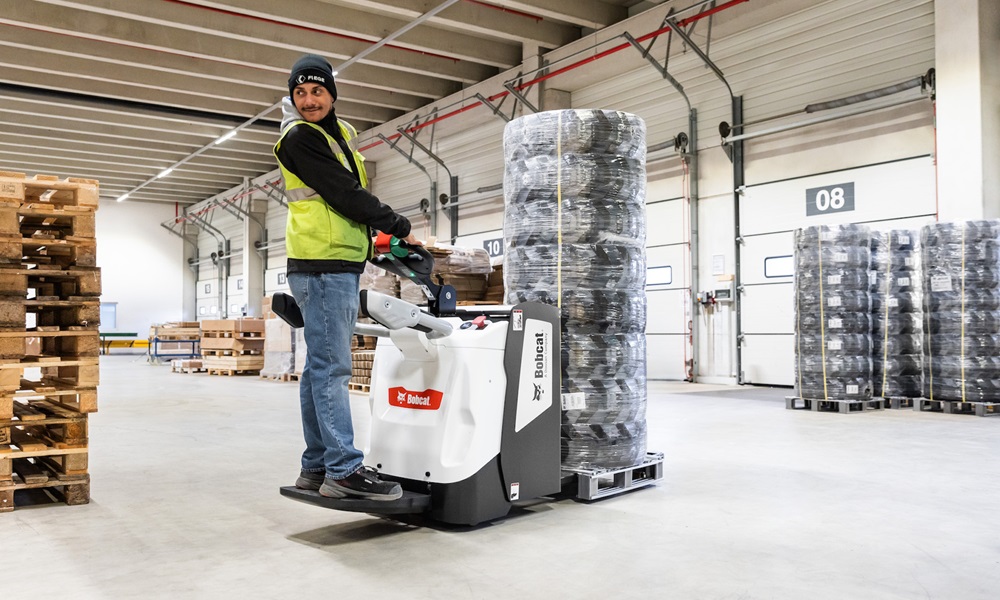Bobcat is set to bring significant advancements to its forklift line following the recent integration of Doosan forklifts into its compact machine portfolio.
The rebranding, which now features Bobcat’s distinctive decal design on the forklifts, signals a broader strategy to incorporate the company’s innovative developments into this product line. Bobcat has confirmed that its research and development (R&D) efforts will prioritise improving connectivity, performance, sustainability, and safety across its forklift offerings.
The acquisition of Doosan Industrial Vehicle, a leading manufacturer of forklift trucks and warehouse equipment, has enabled Bobcat to offer a more comprehensive range of material handling solutions. This expansion builds on Bobcat’s existing lineup of compact loaders and telehandlers, which are widely used across various industries for material handling and logistics. The rebranded forklift range includes a wide array of models, from diesel forklifts with lifting capacities ranging from 2 to 16 tonnes to LPG and electric forklifts with capacities of up to 10 tonnes.
Focus on R&D and Innovation
Bobcat’s commitment to R&D is evident in the seamless integration of its machinery ranges, all designed with a focus on robust, high-performance machines capable of long hours of operation with minimal maintenance. The company’s R&D principles emphasize driver comfort, ease of operation, and safety—elements that are increasingly important in modern material handling environments.
Bobcat’s recent innovations include electric machines such as the E10e and E19e mini-excavators, the T7X fully electric track loader, and the S7X skid-steer loader. These machines are now available in limited markets, with more electric models, like the TL25.60e electric telehandler, in development. Additionally, Bobcat has introduced advanced technologies such as MaxControl for remote machine operation and MachineIQ for real-time monitoring and optimization of machine performance.
Advancing Connectivity and Data Integration
Bobcat is also pushing the boundaries in connectivity, recognizing the importance of real-time data access for enhancing machine performance and productivity. According to Vijayshekhar Nerva, responsible for innovation at Bobcat EMEA, the company’s R&D is guided by four key principles: connectivity, performance, sustainability, and safety. Connectivity ensures that vital data is available in real-time to support efficient operations, while performance focuses on optimizing machines for maximum productivity.
Sustainability is another critical area, with Bobcat emphasizing the use of robust, eco-friendly materials in manufacturing and designing machines for longevity and ease of maintenance. Bobcat’s commitment to safety and efficiency was recently showcased at its Demo Days event in the EMEA region, where visitors witnessed the latest advancements, including the company’s transparent OLED (T-OLED) screen technology. Developed in collaboration with LG and BSI Research, this technology allows operators to access machine functionalities without diverting their attention from the worksite, potentially integrating applications like real-time virtual reality (VR) simulations for complex tasks such as utility line mapping.
Innovations in Electric Forklifts
In the logistics and material handling sectors, Bobcat is also making strides with electric and hydrogen-powered forklifts. The company has recently introduced prototypes like the B18NT electric forklift, featuring a 3-wheel design and lithium battery, and the B30X-7 Plus hydrogen forklift. Additionally, the new NXE series of electric forklifts, now available on the market, offers 4-wheel drive and zero emissions, with capacities ranging from 6 to 10 tonnes. These forklifts are designed for heavy-duty applications in industries such as container transport and machine construction. The NXE series machines can operate for an entire day on a single battery charge and are ideal for factory and warehouse operations, offering excellent visibility and enhanced operator comfort.
